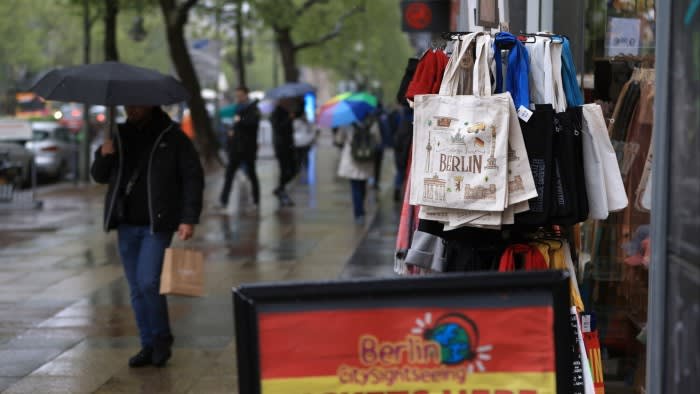Stay informed with free updates
Simply sign up to the German economy myFT Digest — delivered directly to your inbox.
The German government has slightly upgraded its growth forecast for this year, as it sees early signs of a recovery in household spending power and industrial output in Europe’s largest economy.
Germany was the world’s worst-performing major economy last year, with gross domestic product contracting 0.3 per cent and experts warning that it risked becoming the “sick man of Europe”.
But the government said Germany’s economy would grow 0.3 per cent this year, slightly up from its last forecast in February of 0.2 per cent. It forecast an expansion of 1 per cent in 2025, which would still be weaker than expected in many of the world’s major economies.
The energy price shock caused by Russia’s cuts to gas exports after its invasion of Ukraine and a decline in global trade hit Germany harder than other leading economies, while a surge in inflation and high interest rates weighed heavily on Germans’ consumer spending.
But evidence of a turnaround, though modest in scale, is beginning to mount, helped by the fact that wholesale gas and electricity prices have returned to levels before Russia’s full-scale invasion two years ago, providing much-needed relief for industry.
Robert Habeck, economy minister, said Germany was seeing “increasing signs that the economy is gradually recovering and the outlook brightening”. He said industrial production had been “rising noticeably” since the start of the year, even in energy-intensive industries.
Habeck’s ministry added that lower inflation, the prospect of lower interest rates later this year, rising wages and incomes, a stable labour market and stronger exports would all boost activity.
That chimes with the expectations of some leading economists, who predict that inflation will slow more than wages, boosting household spending power and making it likely the European Central Bank will start cutting interest rates in June.
German consumer price inflation slowed to 2.2 per cent in March, its lowest annual rate since June 2021, and the government now expects it to average 2.4 per cent over the whole of 2024, down from 5.9 per cent in 2023.
“Finally people have more money in their pockets and will, as things stand, spend this money,” Habeck said. “Purchasing power is increasing.”
The upward revision for growth came as one of Germany’s leading economic think-tanks, the Ifo institute, announced that business confidence had risen to its highest level for almost a year, lifted by hopes that lower inflation will boost household spending.
The Ifo said its business climate index, based on a survey of 9,000 companies, had risen 1.5 points to 89.4, above the forecasts of economists polled by Reuters, to reach its highest level since May 2023.
Ifo said sentiment improved in most sectors, particularly services. “Companies were more satisfied with their current business. Their expectations also brightened,” said Clemens Fuest, Ifo president.
But Habeck warned that, despite the positive economic news, Germany had to pick up the pace on structural reform. It had “fallen way behind” in terms of competitiveness, and there was an urgent need to reduce bureaucracy, reform European capital markets and tackle a dire skills shortage.
“The biggest short-term structural challenge is the reluctance [of many industries] to invest,” he said. “Any real upturn would be delayed if the construction industry [and] the machine-building industry don’t make the necessary investments in the transformation or in new capital goods.”


